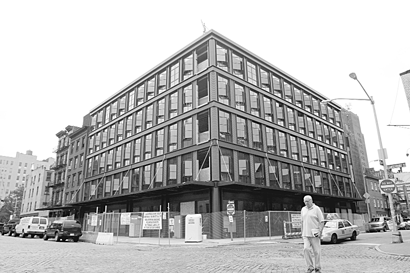The big boys are moving into the Meat Market and surrounding area. Yes, the corporations are coming. And local business boosters aren’t viewing it as a sign that the end is near, like in the movie “The Corporation,” but as a signal that the “new Meat Market” is arriving.
“We’re sort of coming into an adolescence in terms of professional development of the area,” said Annie Washburn, executive director of the Meatpacking District Initiative, a commercial development group whose goal is to support the Market’s functioning as a 24-hour “ecosystem.”
This fall, Theory, a top fashion company, will be moving into its newly constructed building on Gansevoort Plaza at Gansevoort and Greenwich Sts. on the site where Woolco, a food purveyor, formerly was. Theory will have 200 employees at the location, with four floors of office space and retail on the ground floor.
However, the largest corporation in the area is Moet Hennnessy, makers of the champagne and cognac of the same names, which recently took the entire second floor in 85 Tenth Ave., a massive building across the street from the Chelsea Market.
“They’re like a $700 million-a-year company, and they’re here,” Washburn said.
The original corporation to pioneer the Meat Market a few years ago was Bumble and Bumble, the hair products company, which has six floors in a building on W. 13th St.
“Between these companies, we have like 1,000 employees that are coming to the neighborhood every day,” Washburn noted.
But M.P.D.I. feels that — as well as the much-coveted corporations — the Meat Market’s small companies continue to play a key role in the area’s vitality.
“The people who are small who have created businesses in this area, they’re like the fabric of the area,” said Washburn.
M.P.D.I. is currently doing a survey of businesses on buildings’ second floors and above throughout the Meat Market. The study is revealing that the district’s upper floors are home to fashion and furniture showrooms, marketing companies and painters, among others. Office space is one thing the Market lacks, according to Washburn; she said, in many cases, someone will lease a large office space on one of the upper floors, then sublease it to various companies.

































